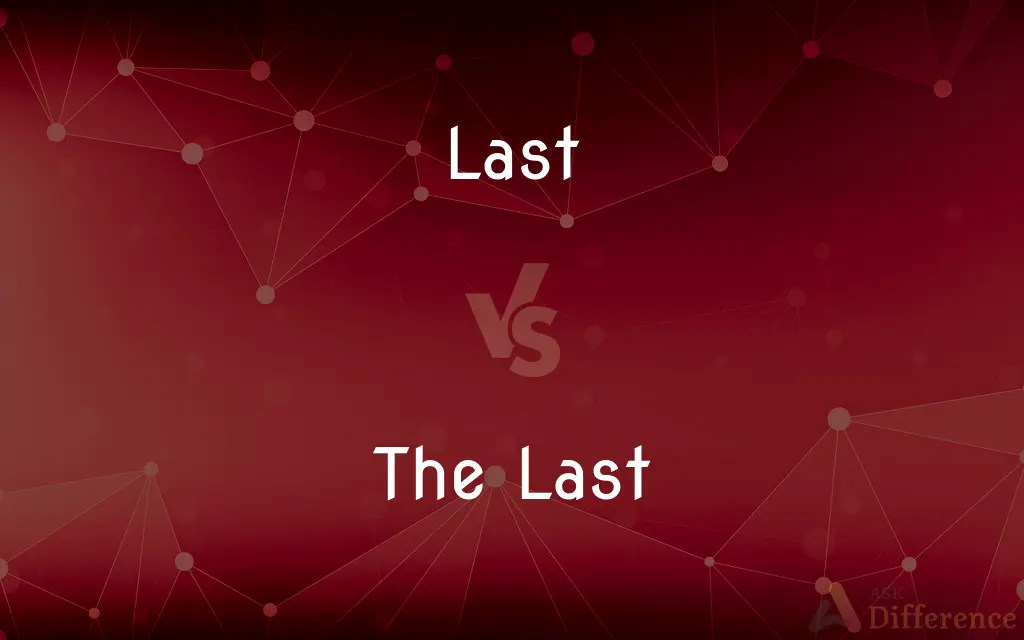Last vs. The Last — What's the Difference?
By Tayyaba Rehman & Fiza Rafique — Published on February 17, 2024
"Last" refers to the final item in a series or the most recent event. "The Last" specifies a particular final item, emphasizing its uniqueness or importance.

Difference Between Last and The Last
Table of Contents
ADVERTISEMENT
Key Differences
The distinction between "Last" and "The Last" lies in their usage and the specificity they convey in English. "Last" is used to describe something that comes after all others in time or order. It is often used to indicate the most recent occurrence of something or the final item in a sequence without necessarily emphasizing its significance beyond its position.
On the other hand, "The Last" is used when specifying a particular item or event that is final, with a stronger emphasis on its finality or the fact that no more items or events of the same kind will follow. This definite article "the" adds a level of specificity and importance, often suggesting that the item or event has a distinct significance compared to others in the sequence.
For example, "last year" refers to the year that just passed, without further implications about its significance. In contrast, "the last day of school" not only indicates the final day in the academic calendar but also carries an implication of significance due to the emotional or ceremonial importance of this specific day.
Furthermore, "Last" can be used as an adjective, adverb, or noun, depending on the context, whereas "The Last" is typically used as a phrase with a noun following it, forming a noun phrase that highlights the importance or significance of the noun it describes.
In summary, while both "Last" and "The Last" refer to something occurring at the end of a series or sequence, "The Last" carries a connotation of finality and uniqueness that "Last" does not necessarily imply. The use of "the" serves to draw attention to the importance or distinctive nature of the item or event being described.
ADVERTISEMENT
Comparison Chart
Usage
General finality without emphasis on uniqueness.
Specific emphasis on uniqueness or importance.
Context
Refers to the most recent or final in a sequence.
Specifies a particular item/event as final.
Connotation
Final in order or sequence.
Final with an emphasis on significance.
Examples
"She arrived last."
"The last piece of cake."
Function
Can be an adjective, adverb, or noun.
Used with a noun to form a noun phrase.
Compare with Definitions
Last
Coming after all others in time or order.
He finished the race last.
The Last
Marks the end of a possibility or option.
This is the last chance to see the exhibit.
Last
Most recent in time.
I saw her last week.
The Last
Highlights a particular instance of finality.
The last episode of the series airs tonight.
Last
Final in a series.
The last chapter of the book is thrilling.
The Last
Specifies a unique or significant final item or event.
The last day of summer was unforgettable.
Last
Being, coming, or placed after all others; final
The last game of the season.
The Last
Emphasizes the end of an era or period.
She was the last to leave the party.
Last
Being the only one left
His last nickel.
As a last resort.
The Last
Indicates something no longer available after this point.
The last ticket just sold out.
Last
Just past; most recent
Last year.
The last time I checked.
Last
Most up-to-date; newest
The last thing in swimwear.
Last
Highest in extent or degree; utmost
To the last measure of human endurance.
Last
Most valid, authoritative, or conclusive
The arbiter will have the last say in resolving this dispute.
Last
Least likely or expected
The last person we would have suspected.
Last
The least desirable or suitable
The last man for the job.
Last
Being the latest possible
Waited until the last second before boarding the train.
Last
Lowest in rank or importance
Last prize.
Last place.
Last
Used as an intensive
Every last dollar was donated to charity.
Last
Of or relating to a terminal period or stage, as of life
The last days of the dinosaurs.
Last
Administered just before death
The last sacraments.
Last
After all others in chronology or sequence
Arrived last.
Last
Most recently
A fashion last popular in the 1940s.
Last
At the end; finally
Add the butter last.
Last
One that is at the end or last
The last to be chosen.
On every page but the last.
Last
The end
Held out until the last.
Last
The final mention or appearance
Haven't seen the last of our troubles.
Last
A block or form shaped like a human foot and used in making or repairing shoes.
Last
A unit of volume or weight varying for different commodities and in different districts, equal to about 80 bushels, 640 gallons, or 2 tons.
Last
To continue in time; go on
The war lasted four years.
Last
To continue; survive
The patient is not expected to last much longer.
Last
To remain in good or usable condition
Produce lasts longer if it is refrigerated. I wanted a car that would last.
Last
To continue in force or practice
Wondered if the marriage would last.
Last
To remain in adequate supply
Will our water last?.
Last
To keep adequately supplied
Left enough bread to last the family for the weekend.
Last
To persist or endure for the entire length of; survive
Hoped to last the season without injuring her leg again.
Last
To mold or shape on a last.
Last
Final, ultimate, coming after all others of its kind.
“Eyes Wide Shut” was the last film to be directed by Stanley Kubrick.
Last
Most recent, latest, last so far.
The last time I saw him, he was married.
I have received your note dated the 17th last, and am responding to say that...}}.
Last
Farthest of all from a given quality, character, or condition; most unlikely, or least preferable.
He is the last person to be accused of theft.
The last person I want to meet is Helen.
More rain is the last thing we need right now.
Last
Being the only one remaining of its class.
Japan is the last empire.
Last
Supreme; highest in degree; utmost.
Last
Lowest in rank or degree.
The last prize
Last
The (one) immediately before the present.
We went there last year.
I was last to arrive.
Last
(of days of the week or months of the year) Closest in the past, or closest but one if the closest was very recent; of days, sometimes thought to specifically refer to the instance closest to seven days (one week) ago, or the most recent instance before seven days (one week) ago.
It's Wednesday, and the party was last Tuesday; that is, not yesterday, but eight days ago.
When you say last Monday, do you mean the Monday just gone, or the one before that?
Last
Most recently.
When we last met, he was based in Toronto.
Last
(sequence) after everything else; finally
I'll go last as I have to add the butter last.
Last but not least
Last
To perform, carry out.
Last
(intransitive) To endure, continue over time.
Summer seems to last longer each year.
They seem happy now, but that won't last long.
Last
(intransitive) To hold out, continue undefeated or entire.
I don't know how much longer we can last without reinforcements.
Last
To shape with a last; to fasten or fit to a last; to place smoothly on a last.
To last a boot
Last
A tool for shaping or preserving the shape of shoes.
Last
(obsolete) A burden; load; a cargo; freight.
Last
(obsolete) A measure of weight or quantity, varying in designation depending on the goods concerned.
Last
(obsolete) An old English (and Dutch) measure of the carrying capacity of a ship, equal to two tons.
Last
A load of some commodity with reference to its weight and commercial value.
Last
Of Last, to endure, contracted from lasteth.
Last
Being after all the others, similarly classed or considered, in time, place, or order of succession; following all the rest; final; hindmost; farthest; as, the last year of a century; the last man in a line of soldiers; the last page in a book; his last chance.
Also day by day, from the first day unto the last day, he read in the book of the law of God.
Fairest of stars, last in the train of night.
Last
Next before the present; as, I saw him last week.
Last
Supreme; highest in degree; utmost.
Contending for principles of the last importance.
Last
Lowest in rank or degree; as, the a last place finish.
Last
Farthest of all from a given quality, character, or condition; most unlikely; having least fitness; as, he is the last person to be accused of theft.
And blunder on in business to the last.
Last
At a time or on an occasion which is the latest of all those spoken of or which have occurred; the last time; as, I saw him last in New York.
Last
In conclusion; finally; lastly.
Pleased with his idol, he commends, admires,Adores; and, last, the thing adored desires.
Last
At a time next preceding the present time.
How long is't now since last yourself and IWere in a mask ?
Last
To continue in time; to endure; to remain in existence.
[I] proffered me to be slave in all that she me would ordain while my life lasted.
Last
To endure use, or continue in existence, without impairment or exhaustion; as, this cloth lasts better than that; the fuel will last through the winter.
Last
To shape with a last; to fasten or fit to a last; to place smoothly on a last; as, to last a boot.
Last
A wooden block shaped like the human foot, on which boots and shoes are formed.
The cobbler is not to go beyond his last.
Last
A load; a heavy burden; hence, a certain weight or measure, generally estimated at 4,000 lbs., but varying for different articles and in different countries. In England, a last of codfish, white herrings, meal, or ashes, is twelve barrels; a last of corn, ten quarters, or eighty bushels, in some parts of England, twenty-one quarters; of gunpowder, twenty-four barrels, each containing 100 lbs; of red herrings, twenty cades, or 20,000; of hides, twelve dozen; of leather, twenty dickers; of pitch and tar, fourteen barrels; of wool, twelve sacks; of flax or feathers, 1,700 lbs.
Last
The burden of a ship; a cargo.
Last
The temporal end; the concluding time;
The stopping point of each round was signaled by a bell
The market was up at the finish
They were playing better at the close of the season
Last
The last or lowest in an ordering or series;
He was the last to leave
He finished an inglorious last
Last
A person's dying act; the last thing a person can do;
He breathed his last
Last
The time at which life ends; continuing until dead;
She stayed until his death
A struggle to the last
Last
A unit of weight equal to 4,000 pounds
Last
A unit of capacity for grain equal to 80 bushels
Last
The concluding parts of an event or occurrence;
The end was exciting
I had to miss the last of the movie
Last
Holding device shaped like a human foot that is used to fashion or repair shoes
Last
Persist or be long; in time;
The bad weather lasted for three days
Last
Continue to live; endure or last;
We went without water and food for 3 days
These superstitions survive in the backwaters of America
The racecar driver lived through several very serious accidents
Last
Immediately past;
Last Thursday
The last chapter we read
Last
Coming after all others in time or space or degree or being the only one remaining;
The last time I saw Paris
The last day of the month
Had the last word
Waited until the last minute
He raised his voice in a last supreme call
The last game of the season
Down to his last nickel
Going from sitting to standing without intermediate pushes with the hands
Intermediate stages in a process
Intermediate stops on the route
An intermediate level
Last
Occurring at or forming an end or termination;
His concluding words came as a surprise
The final chapter
The last days of the dinosaurs
Terminal leave
Last
Conclusive in a process or progression;
The final answer
A last resort
The net result
Last
Most unlikely or unsuitable;
The last person we would have suspected
The last man they would have chosen for the job
Last
Occurring at the time of death;
His last words
The last rites
Last
Not to be altered or undone;
The judge's decision is final
The arbiter will have the last say
Last
Lowest in rank or importance;
Last prize
In last place
Last
Highest in extent or degree;
To the last measure of human endurance
Whether they were accomplices in the last degree or a lesser one was...to be determined individually
Last
In accord with the most fashionable ideas or style;
Wears only the latest style
The last thing in swimwear
Knows the newest dances
Cutting-edge technology
A with-it boutique
Last
More recently than any other time;
I saw him last in London
Last
The item at the end;
Last, I'll discuss family values
Last
Remaining after others are gone or used.
This is the last slice of pizza.
Last
Enduring beyond others.
This battery lasts longer than others.
Common Curiosities
Is "the last" always about time?
Not always; it can refer to order, time, or significance.
Can "last" be used without "the"?
Yes, "last" can be used without "the" when not emphasizing a specific instance.
Does "the last" imply no more in the future?
Often, it suggests a finality or an end to a series or possibility.
Is "the last" used for positive or negative emphasis?
It can be used for both, depending on the context.
Can "last" imply survival?
Yes, as in "the last one standing."
How does "last" function in a sentence?
It can be an adjective ("the last person"), an adverb ("arrived last"), or a noun ("the last of the wine").
Can there be more than one "last" in a series?
Conceptually no, but multiple things can be "last" if occurring simultaneously.
Can "last" indicate durability?
Yes, in contexts like "This product lasts longer."
Do "last" and "the last" have the same grammatical role?
They can, but "the last" is more specific, often forming a noun phrase.
Can "last" and "the last" be used interchangeably?
Not always, as "the last" adds specificity and emphasis not present with "last" alone.
Is "the last" only for objects?
No, it can refer to time periods, events, people, or objects.
Can "last" refer to the past only?
Primarily, but it can imply continuity into the present, as in durability.
How do I choose between "last" and "the last"?
Consider whether you need to emphasize a specific final instance or are simply stating an order or time.
Does "the last" make something more important?
It can, by highlighting its significance or finality.
Does "the last" apply to future events?
It can, especially in planning or forecasting, as in "the last time we'll offer this sale."
Share Your Discovery

Previous Comparison
Olefins vs. Paraffins
Next Comparison
POM-H vs. POM-CAuthor Spotlight
Written by
Tayyaba RehmanTayyaba Rehman is a distinguished writer, currently serving as a primary contributor to askdifference.com. As a researcher in semantics and etymology, Tayyaba's passion for the complexity of languages and their distinctions has found a perfect home on the platform. Tayyaba delves into the intricacies of language, distinguishing between commonly confused words and phrases, thereby providing clarity for readers worldwide.
Co-written by
Fiza RafiqueFiza Rafique is a skilled content writer at AskDifference.com, where she meticulously refines and enhances written pieces. Drawing from her vast editorial expertise, Fiza ensures clarity, accuracy, and precision in every article. Passionate about language, she continually seeks to elevate the quality of content for readers worldwide.
















































